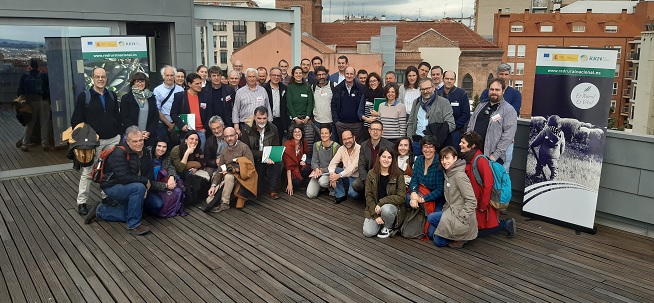
02 de March de 2020
Innovación
February 26, 2020. Innovation is the key factor uniting these working groups. Twelve projects have been submitted, seeking to share their replicability with the rest of the participants.
The National Rural Network (RRN) has brought together key stakeholders in the field of organic farming, organized around, among others, the Operational Groups and Innovative Projects: groups of different types of organizations and experts who work together on a problem to be solved from an innovation perspective, and, on the other hand, projects are implemented to put the solutions obtained into practice.
Twelve projects were presented at this meeting, with the aim of discussing their results, opportunities, challenges, and the potential for transferring the innovations they are developing in their fields. Among the projects presented were projects funded by the EAFRD , the European Agricultural Fund for Rural Development, and others developed under the European research framework program Horizon 2020 and thematic networks. This will enhance networking among beneficiaries of different European policies.
Spain, in the lead
Following an introduction by Patricia Martínez, Head of Area of the Subdirectorate General for Rural Environment Promotion of the Ministry of Agriculture, Fisheries and Food (MAPA) - outlining the role of the RRN as a meeting and information platform for the dissemination of rural development - José Miguel González Otero, of the Subdirectorate General for Differentiated Quality and Organic Agriculture, of MAPA, has placed Spain at the head of the European Union in this area, thanks to the evolution of the number of industries associated with this type of production.
Cecilia Bretal Koenig, from the MAPA's Subdirectorate General for Innovation and Digitalisation, has presented the progress of the European Innovation Partnership (AEI-AGRI) grants, within the framework of the PNDR 2014-2020 , for the establishment of supra-regional Operational Groups , as well as the projects launched to boost innovation processes in the agri-food and forestry sectors.
Thematic work rooms
The participants were organized into different work rooms. The groups and projects were organized by theme as follows:
- Seed quality and genetic improvement
Operational Groups/Projects: LIVESEED and the Operational Group Association for the promotion of conservation and production of native and traditional plants
Work and conclusions: Recovering, processing, genetically improving, and promoting the use of organic seed varieties adapted to agricultural systems is key and essential to meeting a type of production and food demand for which is increasing. The current challenge is to work in this area to overcome barriers to availability, use, and regulation surrounding organic seeds.
- Information technologies
Operational Groups/Projects: AsturfarM2M Operational Group and Water Footprint in the Andalusian Organic Sector
Work and conclusions: The availability and access of the productive sector, particularly the ecological sector, to technological tools is presented as a challenge that would facilitate tasks at the exploitation level, make efficient use of natural resources and make it more competitive .
- Networking
Operational Groups/Projects: Networking Association and PTAEEX
Work and conclusions: The need to connect stakeholders throughout the agri-food system, transfer knowledge among them, and transfer the results of innovations, with an emphasis on understanding the demands of the productive sector , is evident. The creation of platforms helps achieve this, but further work is needed to build and strengthen them.
- Quality of agri-food products
Operational Groups/Projects: Eco-llevat, on organic yeast for winemaking , and the GOIAEX Operational Group
Papers and conclusions: The need to enhance the value of research in organic production was discussed. Specifically, these groups/projects address yeast development. When applied to organic crops and agri-food products, this approach improves their shelf life and makes the sector more competitive.
- Knowledge transfer
Operational Groups/Projects: ECOPIONET Operational Group and Ok-Net Ecofeed
Work and conclusions: It is considered crucial for the organic sector to make progress in making information and developed innovations available to producers, as well as making them accessible to them. Creating effective channels for this communication is considered an area where progress is needed, specifically in organic production.
- Pre-harvest practices
Operational Groups/Projects: MACMHER and Trigopaneco
Work and conclusions: Exploring and disseminating management techniques implemented in the field phase to improve the quality of organic crops, such as eliminating competition in the vineyard and obtaining bread wheat with baking qualities, can allow their export to other organic production sectors, which are systems in which demand is constantly increasing.
This series of meetings will continue in March and April, focusing on areas such as agricultural plant health, animal health, and the agri-food industry. These events will be publicized on the RRN's social media channels and through the events calendar on the RRN website.









